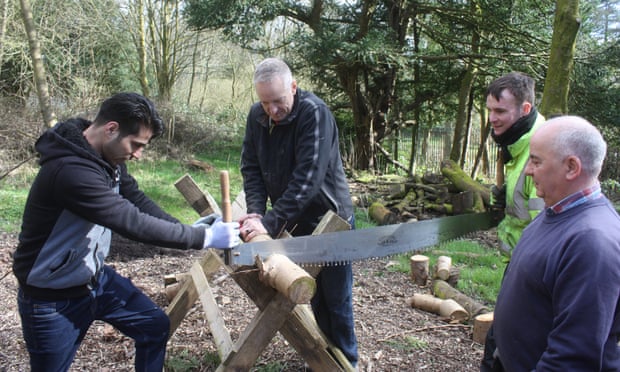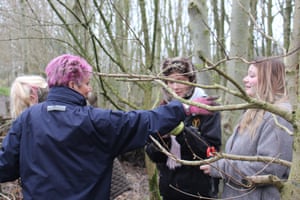
Volunteers in Lancashire take part in a conservation project run by the Wildlife Trusts. Photograph: Alan Wright/Wildlife Trusts
Volunteers on wildlife projects benefit from a big boost to their mental health, according to new research. It advances the idea that nature could be widely prescribed by doctors as a therapy, which its supporters say would ease the burden on the NHS.
The new analysis tracked people across England taking part in projects run by the Wildlife Trusts, ranging from nature walks and conservation work to the Men in Sheds project in Bolton, which makes bird tables and bug hotels.
The volunteers’ wellbeing was tracked using questionnaires by researchers from the University of Essex and they found that half of the people who started with low mental wellbeing had improved after 12 weeks. Two-thirds of all the participants noticed improved wellbeing within six weeks.
Some of the volunteers had experienced poor mental health and been referred to the Wildlife Trusts’ schemes by GPs, health centres and NHS trusts. The experience of wildlife, gardening and craftwork was transformational for some. “Getting out in nature makes me feel like I’ve been born again,” said one. “It has stopped me living under a duvet all day,” said another.

“The evidence is loud and clear – volunteering in wild places while being supported by Wildlife Trust staff has a clear impact on people’s health,” said Dominic Higgins at the Wildlife Trusts. “It makes people feel better, happier and more connected to other people. The Department of Health should take note – our findings could help reduce the current burden on the NHS because they illustrate a new model of caring for people that does not rely solely on medication and traditional services.”
Mike Rogerson at the University of Essex, who led the new research, said: “At a time when we are losing count of the crises in local- and national-level health, engagement with these volunteering activities can provide a much-needed antidote for individuals, local areas and the UK as a whole.”
There is good evidence that contact with nature is beneficial for both physical and mental health, and a government assessment in 2011 estimated that the health and welfare benefits of green spaces were £30bn a year. But these benefits are rarely taken into account by decision-makers and huge numbers of green spaces have been lost to development in recent decades. In February, a committee of MPs warned that Britain’s cash-starved parks were at the tipping point of decline.
“There has been extensive research on the health-damaging effects of the concrete jungle, so we should not be surprised that mental health is improved by the natural environment,” said Prof John Middleton, president of the UK Faculty of Public Health. “It is a great step forward that this research has now shown some of the benefits. Authorities should look to develop such schemes – it is cheaper than medication and social care, and the improvements to the environment made by volunteers also give us a lasting legacy for the community.”
Rogerson said there are a small number of doctors, both in Europe and the US, who do prescribe nature as a remedy for mental health problems, but that it could be done much more widely: “It needs to be on the map for decision-makers – that is the only thing that is missing.”
Higgins said access to wildlife-rich green spaces was important: “Those responsible for public health, planning, transport, parks and leisure need to work together to make nature more accessible to people.”
The new analysis followed 139 volunteers on Wildlife Trust projects in Gloucestershire, Avon, Nottinghamshire, Tees Valley and Lancashire. “There were improvements for everybody, that is the most important thing to say,” said Rogerson. “But also the individuals who scored poorest on wellbeing from the start, then showed the greatest improvement.”

At the start of the study, 39% of the participants reported low wellbeing, compared with UK average scores, but after 12 weeks of increased exposure to nature this had fallen to 19%. “It has helped my depression and agitation and helped me to wind down and make decisions about my life,” said one participant. On average, across all the volunteers there was a statistically significant improvement of 8% in wellbeing scores, which measure how people feel about themselves.
Rogerson said bigger studies of the impact of nature on people’s health, with formal control groups like those used in drug trials, were the next step needed. “At the moment there is a very, very strong association, but scientifically you can’t hang your hat on it,” he said. “The evidence base has grown over the last 10 years and confidence is getting there. Now we need to go to the next level to push it over the line and give GPs the confidence that they can prescribe it.”
There is a growing interest in “social prescribing”, ie non-medical ways of tackling ill health. In 2014, a groundbreaking trial showed that GPs could transform lives and slash the huge sums spent by the NHS on cold-related problems by prescribing double glazing and loft insulation for patients living in cold, damp homes.
[“Source-theguardian”]




